Winston-Salem State University: NUR 6323 Health Care Bill Critique
VerifiedAdded on 2022/08/12
|5
|1544
|22
Homework Assignment
AI Summary
This assignment critiques "The Save Act," a North Carolina bill aimed at increasing the training of registered nurses to improve healthcare standards. The critique, completed by a student at Winston-Salem State University for NUR 6323, analyzes the bill's introduction, historical perspective, content, healthcare policies addressed, significant facts, fiscal impact, and the student's personal perspective. The bill seeks to modernize nursing regulations, allowing advanced practice registered nurses (APRNs) to take on more responsibilities, particularly in areas where doctors are scarce. The analysis highlights the bill's purpose, sponsors, and status, as well as its potential impact on healthcare access, manpower, and economic considerations. The student supports the bill, emphasizing the importance of nurses' roles and training in delivering comprehensive patient care. References to relevant literature and legislative resources are also included to support the analysis.
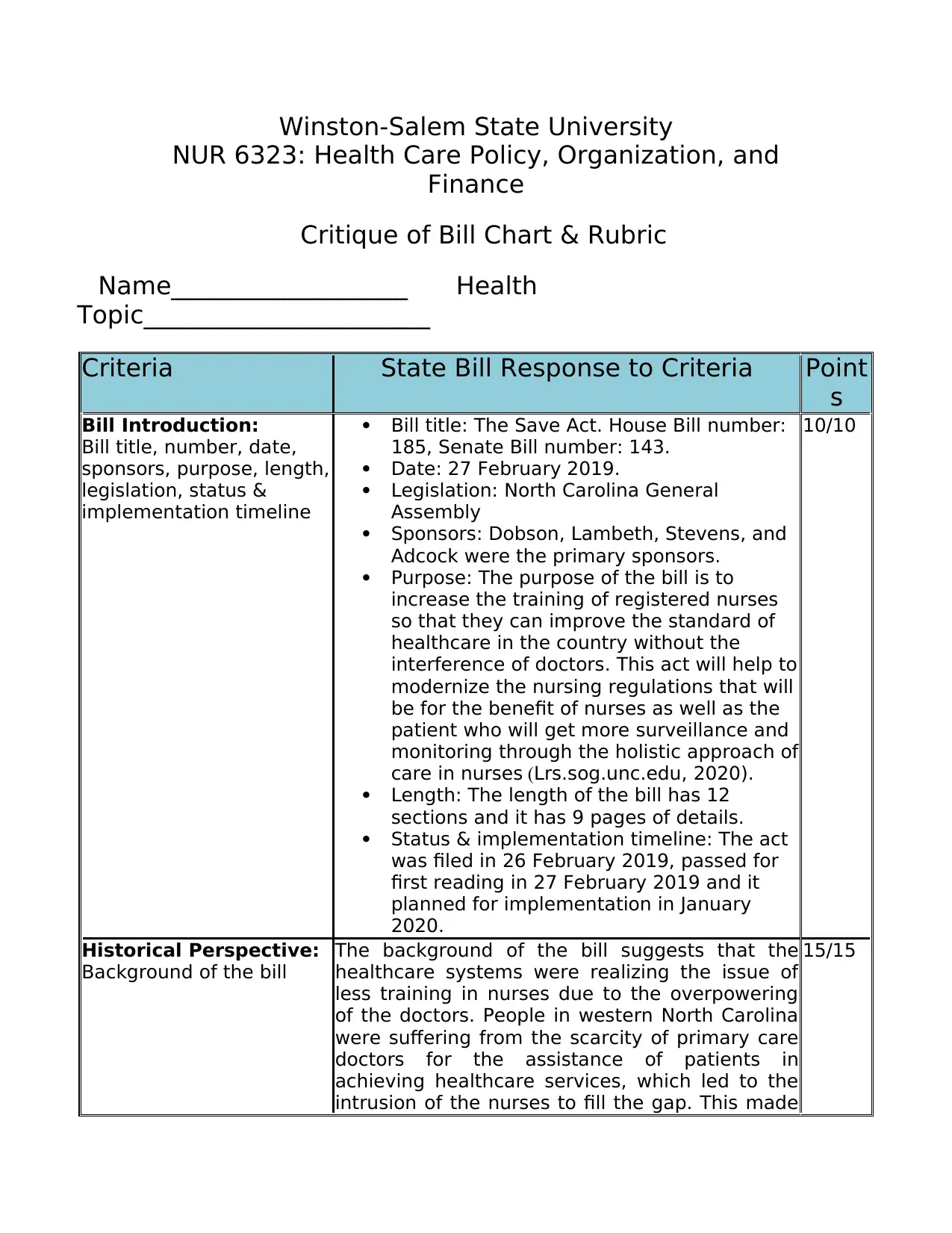
Winston-Salem State University
NUR 6323: Health Care Policy, Organization, and
Finance
Critique of Bill Chart & Rubric
Name___________________ Health
Topic_______________________
Criteria State Bill Response to Criteria Point
s
Bill Introduction:
Bill title, number, date,
sponsors, purpose, length,
legislation, status &
implementation timeline
Bill title: The Save Act. House Bill number:
185, Senate Bill number: 143.
Date: 27 February 2019.
Legislation: North Carolina General
Assembly
Sponsors: Dobson, Lambeth, Stevens, and
Adcock were the primary sponsors.
Purpose: The purpose of the bill is to
increase the training of registered nurses
so that they can improve the standard of
healthcare in the country without the
interference of doctors. This act will help to
modernize the nursing regulations that will
be for the benefit of nurses as well as the
patient who will get more surveillance and
monitoring through the holistic approach of
care in nurses (Lrs.sog.unc.edu, 2020).
Length: The length of the bill has 12
sections and it has 9 pages of details.
Status & implementation timeline: The act
was filed in 26 February 2019, passed for
first reading in 27 February 2019 and it
planned for implementation in January
2020.
10/10
Historical Perspective:
Background of the bill
The background of the bill suggests that the
healthcare systems were realizing the issue of
less training in nurses due to the overpowering
of the doctors. People in western North Carolina
were suffering from the scarcity of primary care
doctors for the assistance of patients in
achieving healthcare services, which led to the
intrusion of the nurses to fill the gap. This made
15/15
NUR 6323: Health Care Policy, Organization, and
Finance
Critique of Bill Chart & Rubric
Name___________________ Health
Topic_______________________
Criteria State Bill Response to Criteria Point
s
Bill Introduction:
Bill title, number, date,
sponsors, purpose, length,
legislation, status &
implementation timeline
Bill title: The Save Act. House Bill number:
185, Senate Bill number: 143.
Date: 27 February 2019.
Legislation: North Carolina General
Assembly
Sponsors: Dobson, Lambeth, Stevens, and
Adcock were the primary sponsors.
Purpose: The purpose of the bill is to
increase the training of registered nurses
so that they can improve the standard of
healthcare in the country without the
interference of doctors. This act will help to
modernize the nursing regulations that will
be for the benefit of nurses as well as the
patient who will get more surveillance and
monitoring through the holistic approach of
care in nurses (Lrs.sog.unc.edu, 2020).
Length: The length of the bill has 12
sections and it has 9 pages of details.
Status & implementation timeline: The act
was filed in 26 February 2019, passed for
first reading in 27 February 2019 and it
planned for implementation in January
2020.
10/10
Historical Perspective:
Background of the bill
The background of the bill suggests that the
healthcare systems were realizing the issue of
less training in nurses due to the overpowering
of the doctors. People in western North Carolina
were suffering from the scarcity of primary care
doctors for the assistance of patients in
achieving healthcare services, which led to the
intrusion of the nurses to fill the gap. This made
15/15
Paraphrase This Document
Need a fresh take? Get an instant paraphrase of this document with our AI Paraphraser
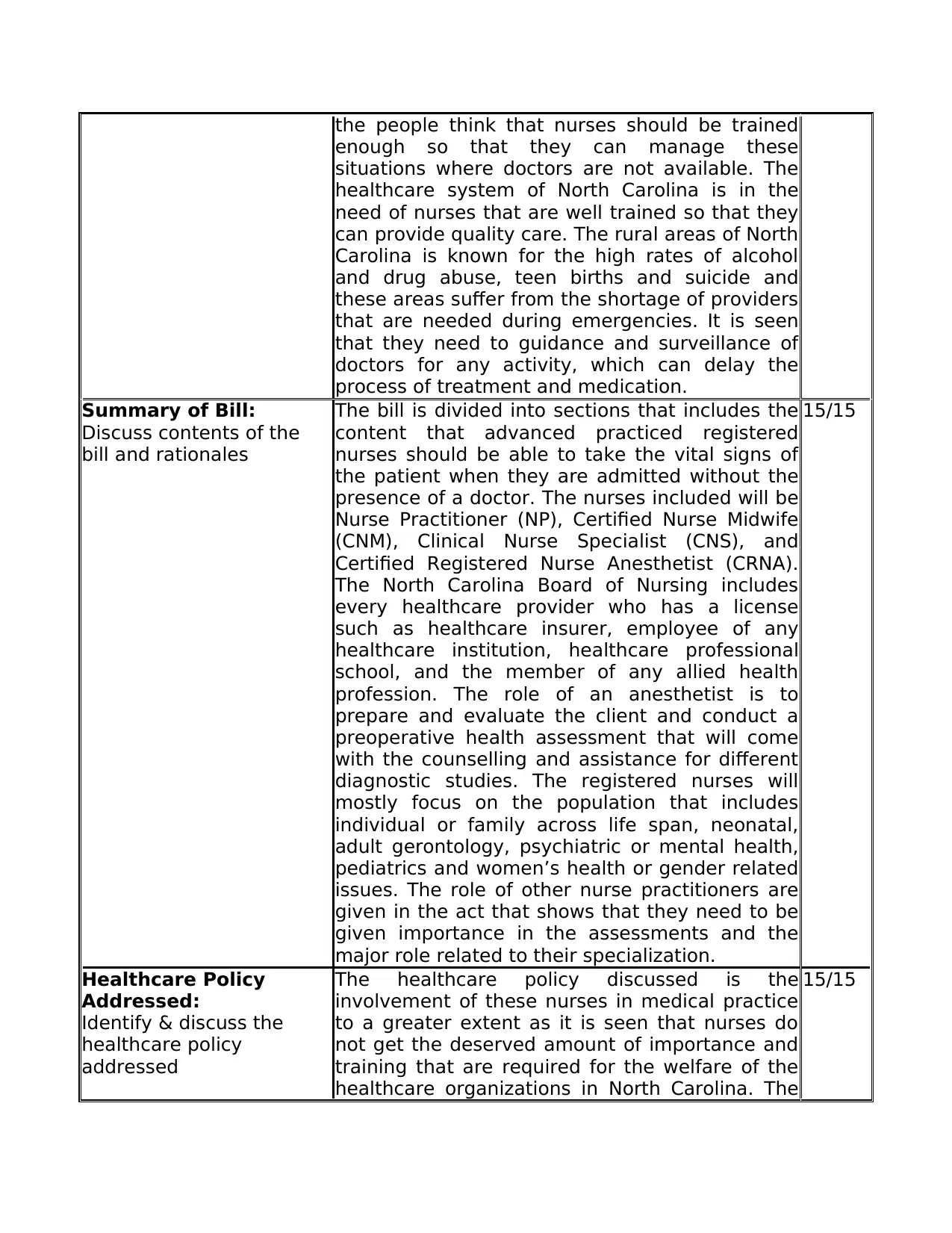
the people think that nurses should be trained
enough so that they can manage these
situations where doctors are not available. The
healthcare system of North Carolina is in the
need of nurses that are well trained so that they
can provide quality care. The rural areas of North
Carolina is known for the high rates of alcohol
and drug abuse, teen births and suicide and
these areas suffer from the shortage of providers
that are needed during emergencies. It is seen
that they need to guidance and surveillance of
doctors for any activity, which can delay the
process of treatment and medication.
Summary of Bill:
Discuss contents of the
bill and rationales
The bill is divided into sections that includes the
content that advanced practiced registered
nurses should be able to take the vital signs of
the patient when they are admitted without the
presence of a doctor. The nurses included will be
Nurse Practitioner (NP), Certified Nurse Midwife
(CNM), Clinical Nurse Specialist (CNS), and
Certified Registered Nurse Anesthetist (CRNA).
The North Carolina Board of Nursing includes
every healthcare provider who has a license
such as healthcare insurer, employee of any
healthcare institution, healthcare professional
school, and the member of any allied health
profession. The role of an anesthetist is to
prepare and evaluate the client and conduct a
preoperative health assessment that will come
with the counselling and assistance for different
diagnostic studies. The registered nurses will
mostly focus on the population that includes
individual or family across life span, neonatal,
adult gerontology, psychiatric or mental health,
pediatrics and women’s health or gender related
issues. The role of other nurse practitioners are
given in the act that shows that they need to be
given importance in the assessments and the
major role related to their specialization.
15/15
Healthcare Policy
Addressed:
Identify & discuss the
healthcare policy
addressed
The healthcare policy discussed is the
involvement of these nurses in medical practice
to a greater extent as it is seen that nurses do
not get the deserved amount of importance and
training that are required for the welfare of the
healthcare organizations in North Carolina. The
15/15
enough so that they can manage these
situations where doctors are not available. The
healthcare system of North Carolina is in the
need of nurses that are well trained so that they
can provide quality care. The rural areas of North
Carolina is known for the high rates of alcohol
and drug abuse, teen births and suicide and
these areas suffer from the shortage of providers
that are needed during emergencies. It is seen
that they need to guidance and surveillance of
doctors for any activity, which can delay the
process of treatment and medication.
Summary of Bill:
Discuss contents of the
bill and rationales
The bill is divided into sections that includes the
content that advanced practiced registered
nurses should be able to take the vital signs of
the patient when they are admitted without the
presence of a doctor. The nurses included will be
Nurse Practitioner (NP), Certified Nurse Midwife
(CNM), Clinical Nurse Specialist (CNS), and
Certified Registered Nurse Anesthetist (CRNA).
The North Carolina Board of Nursing includes
every healthcare provider who has a license
such as healthcare insurer, employee of any
healthcare institution, healthcare professional
school, and the member of any allied health
profession. The role of an anesthetist is to
prepare and evaluate the client and conduct a
preoperative health assessment that will come
with the counselling and assistance for different
diagnostic studies. The registered nurses will
mostly focus on the population that includes
individual or family across life span, neonatal,
adult gerontology, psychiatric or mental health,
pediatrics and women’s health or gender related
issues. The role of other nurse practitioners are
given in the act that shows that they need to be
given importance in the assessments and the
major role related to their specialization.
15/15
Healthcare Policy
Addressed:
Identify & discuss the
healthcare policy
addressed
The healthcare policy discussed is the
involvement of these nurses in medical practice
to a greater extent as it is seen that nurses do
not get the deserved amount of importance and
training that are required for the welfare of the
healthcare organizations in North Carolina. The
15/15
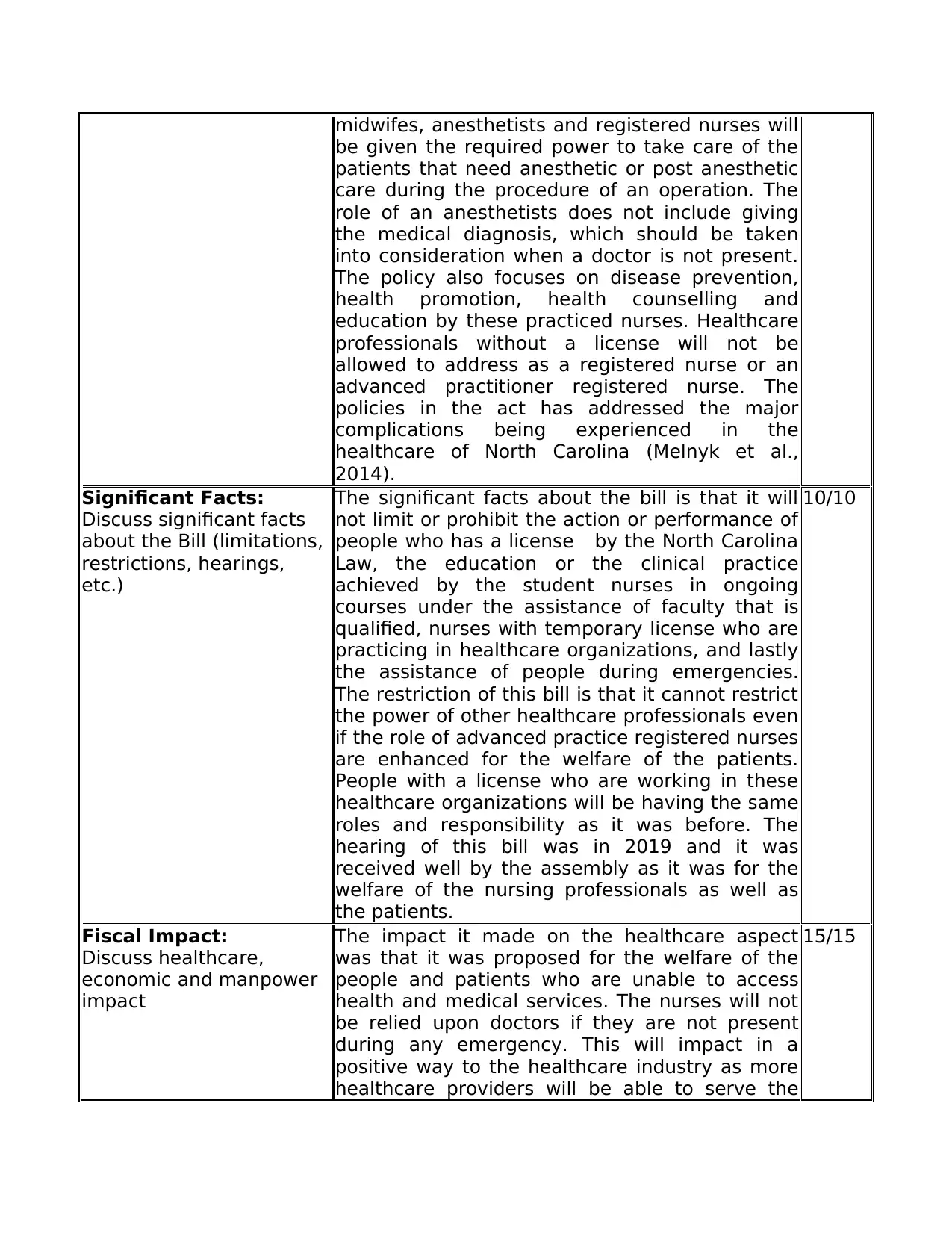
midwifes, anesthetists and registered nurses will
be given the required power to take care of the
patients that need anesthetic or post anesthetic
care during the procedure of an operation. The
role of an anesthetists does not include giving
the medical diagnosis, which should be taken
into consideration when a doctor is not present.
The policy also focuses on disease prevention,
health promotion, health counselling and
education by these practiced nurses. Healthcare
professionals without a license will not be
allowed to address as a registered nurse or an
advanced practitioner registered nurse. The
policies in the act has addressed the major
complications being experienced in the
healthcare of North Carolina (Melnyk et al.,
2014).
Significant Facts:
Discuss significant facts
about the Bill (limitations,
restrictions, hearings,
etc.)
The significant facts about the bill is that it will
not limit or prohibit the action or performance of
people who has a license by the North Carolina
Law, the education or the clinical practice
achieved by the student nurses in ongoing
courses under the assistance of faculty that is
qualified, nurses with temporary license who are
practicing in healthcare organizations, and lastly
the assistance of people during emergencies.
The restriction of this bill is that it cannot restrict
the power of other healthcare professionals even
if the role of advanced practice registered nurses
are enhanced for the welfare of the patients.
People with a license who are working in these
healthcare organizations will be having the same
roles and responsibility as it was before. The
hearing of this bill was in 2019 and it was
received well by the assembly as it was for the
welfare of the nursing professionals as well as
the patients.
10/10
Fiscal Impact:
Discuss healthcare,
economic and manpower
impact
The impact it made on the healthcare aspect
was that it was proposed for the welfare of the
people and patients who are unable to access
health and medical services. The nurses will not
be relied upon doctors if they are not present
during any emergency. This will impact in a
positive way to the healthcare industry as more
healthcare providers will be able to serve the
15/15
be given the required power to take care of the
patients that need anesthetic or post anesthetic
care during the procedure of an operation. The
role of an anesthetists does not include giving
the medical diagnosis, which should be taken
into consideration when a doctor is not present.
The policy also focuses on disease prevention,
health promotion, health counselling and
education by these practiced nurses. Healthcare
professionals without a license will not be
allowed to address as a registered nurse or an
advanced practitioner registered nurse. The
policies in the act has addressed the major
complications being experienced in the
healthcare of North Carolina (Melnyk et al.,
2014).
Significant Facts:
Discuss significant facts
about the Bill (limitations,
restrictions, hearings,
etc.)
The significant facts about the bill is that it will
not limit or prohibit the action or performance of
people who has a license by the North Carolina
Law, the education or the clinical practice
achieved by the student nurses in ongoing
courses under the assistance of faculty that is
qualified, nurses with temporary license who are
practicing in healthcare organizations, and lastly
the assistance of people during emergencies.
The restriction of this bill is that it cannot restrict
the power of other healthcare professionals even
if the role of advanced practice registered nurses
are enhanced for the welfare of the patients.
People with a license who are working in these
healthcare organizations will be having the same
roles and responsibility as it was before. The
hearing of this bill was in 2019 and it was
received well by the assembly as it was for the
welfare of the nursing professionals as well as
the patients.
10/10
Fiscal Impact:
Discuss healthcare,
economic and manpower
impact
The impact it made on the healthcare aspect
was that it was proposed for the welfare of the
people and patients who are unable to access
health and medical services. The nurses will not
be relied upon doctors if they are not present
during any emergency. This will impact in a
positive way to the healthcare industry as more
healthcare providers will be able to serve the
15/15
⊘ This is a preview!⊘
Do you want full access?
Subscribe today to unlock all pages.

Trusted by 1+ million students worldwide
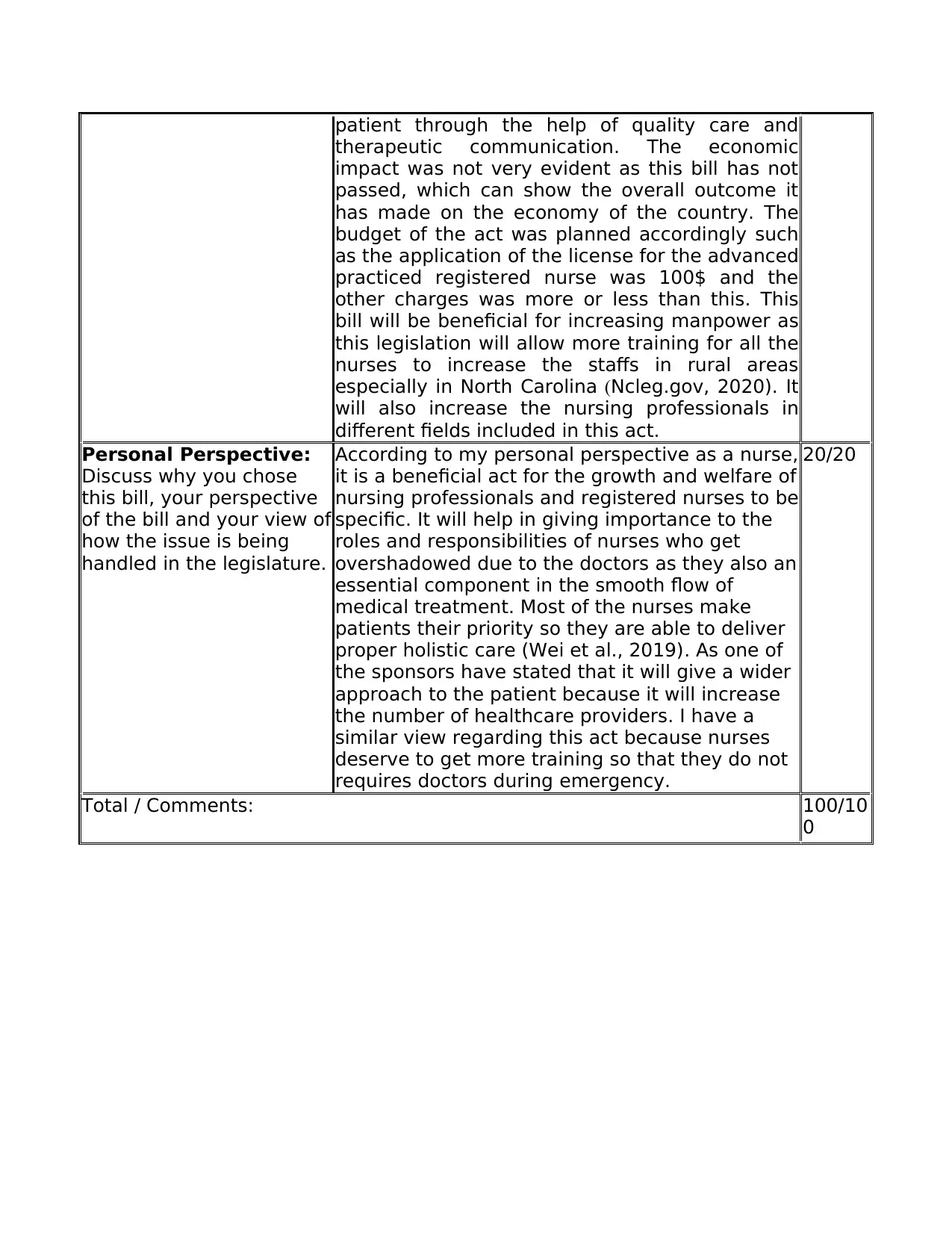
patient through the help of quality care and
therapeutic communication. The economic
impact was not very evident as this bill has not
passed, which can show the overall outcome it
has made on the economy of the country. The
budget of the act was planned accordingly such
as the application of the license for the advanced
practiced registered nurse was 100$ and the
other charges was more or less than this. This
bill will be beneficial for increasing manpower as
this legislation will allow more training for all the
nurses to increase the staffs in rural areas
especially in North Carolina (Ncleg.gov, 2020). It
will also increase the nursing professionals in
different fields included in this act.
Personal Perspective:
Discuss why you chose
this bill, your perspective
of the bill and your view of
how the issue is being
handled in the legislature.
According to my personal perspective as a nurse,
it is a beneficial act for the growth and welfare of
nursing professionals and registered nurses to be
specific. It will help in giving importance to the
roles and responsibilities of nurses who get
overshadowed due to the doctors as they also an
essential component in the smooth flow of
medical treatment. Most of the nurses make
patients their priority so they are able to deliver
proper holistic care (Wei et al., 2019). As one of
the sponsors have stated that it will give a wider
approach to the patient because it will increase
the number of healthcare providers. I have a
similar view regarding this act because nurses
deserve to get more training so that they do not
requires doctors during emergency.
20/20
Total / Comments: 100/10
0
therapeutic communication. The economic
impact was not very evident as this bill has not
passed, which can show the overall outcome it
has made on the economy of the country. The
budget of the act was planned accordingly such
as the application of the license for the advanced
practiced registered nurse was 100$ and the
other charges was more or less than this. This
bill will be beneficial for increasing manpower as
this legislation will allow more training for all the
nurses to increase the staffs in rural areas
especially in North Carolina (Ncleg.gov, 2020). It
will also increase the nursing professionals in
different fields included in this act.
Personal Perspective:
Discuss why you chose
this bill, your perspective
of the bill and your view of
how the issue is being
handled in the legislature.
According to my personal perspective as a nurse,
it is a beneficial act for the growth and welfare of
nursing professionals and registered nurses to be
specific. It will help in giving importance to the
roles and responsibilities of nurses who get
overshadowed due to the doctors as they also an
essential component in the smooth flow of
medical treatment. Most of the nurses make
patients their priority so they are able to deliver
proper holistic care (Wei et al., 2019). As one of
the sponsors have stated that it will give a wider
approach to the patient because it will increase
the number of healthcare providers. I have a
similar view regarding this act because nurses
deserve to get more training so that they do not
requires doctors during emergency.
20/20
Total / Comments: 100/10
0
Paraphrase This Document
Need a fresh take? Get an instant paraphrase of this document with our AI Paraphraser
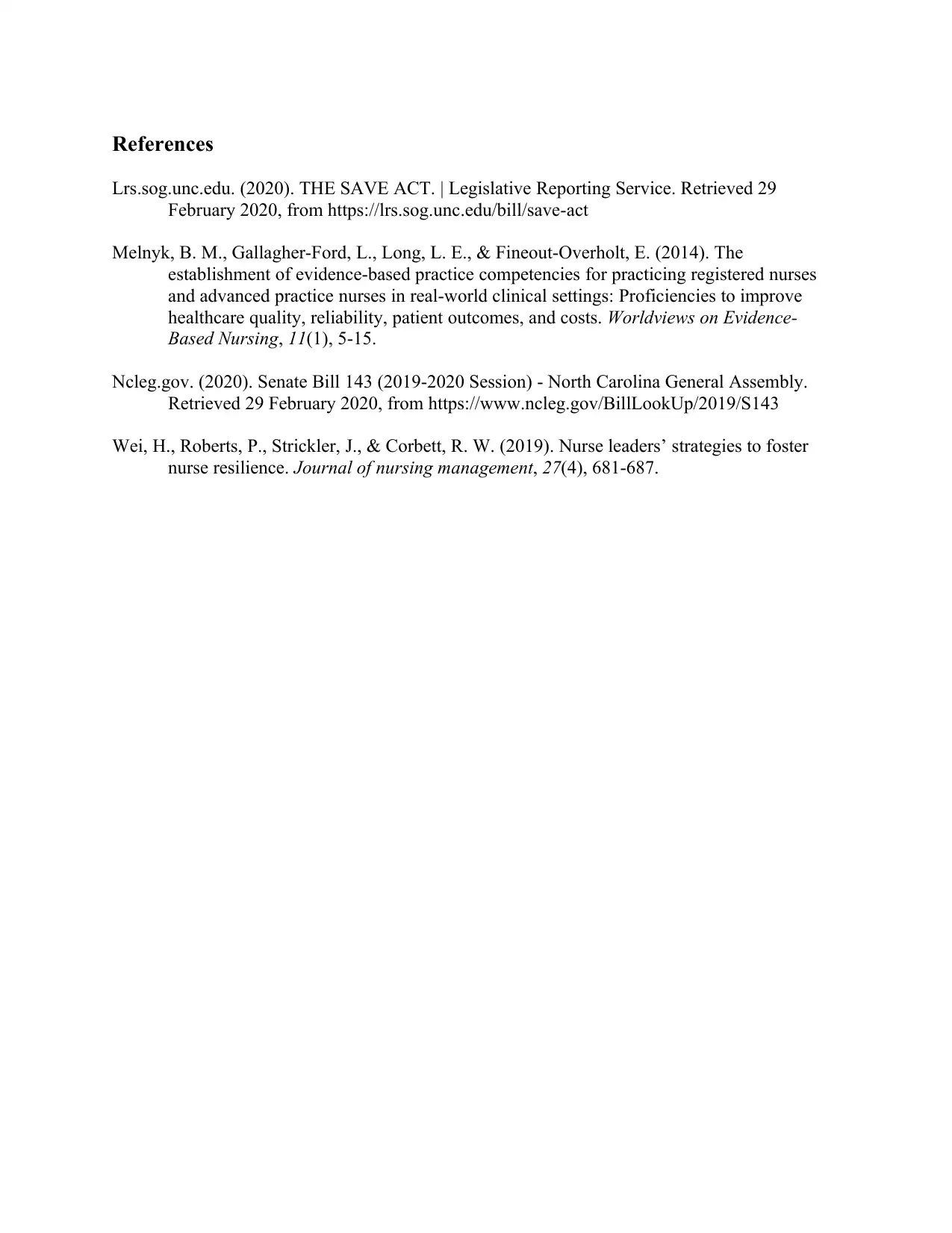
References
Lrs.sog.unc.edu. (2020). THE SAVE ACT. | Legislative Reporting Service. Retrieved 29
February 2020, from https://lrs.sog.unc.edu/bill/save-act
Melnyk, B. M., Gallagher‐Ford, L., Long, L. E., & Fineout‐Overholt, E. (2014). The
establishment of evidence‐based practice competencies for practicing registered nurses
and advanced practice nurses in real‐world clinical settings: Proficiencies to improve
healthcare quality, reliability, patient outcomes, and costs. Worldviews on Evidence‐
Based Nursing, 11(1), 5-15.
Ncleg.gov. (2020). Senate Bill 143 (2019-2020 Session) - North Carolina General Assembly.
Retrieved 29 February 2020, from https://www.ncleg.gov/BillLookUp/2019/S143
Wei, H., Roberts, P., Strickler, J., & Corbett, R. W. (2019). Nurse leaders’ strategies to foster
nurse resilience. Journal of nursing management, 27(4), 681-687.
Lrs.sog.unc.edu. (2020). THE SAVE ACT. | Legislative Reporting Service. Retrieved 29
February 2020, from https://lrs.sog.unc.edu/bill/save-act
Melnyk, B. M., Gallagher‐Ford, L., Long, L. E., & Fineout‐Overholt, E. (2014). The
establishment of evidence‐based practice competencies for practicing registered nurses
and advanced practice nurses in real‐world clinical settings: Proficiencies to improve
healthcare quality, reliability, patient outcomes, and costs. Worldviews on Evidence‐
Based Nursing, 11(1), 5-15.
Ncleg.gov. (2020). Senate Bill 143 (2019-2020 Session) - North Carolina General Assembly.
Retrieved 29 February 2020, from https://www.ncleg.gov/BillLookUp/2019/S143
Wei, H., Roberts, P., Strickler, J., & Corbett, R. W. (2019). Nurse leaders’ strategies to foster
nurse resilience. Journal of nursing management, 27(4), 681-687.
1 out of 5
Your All-in-One AI-Powered Toolkit for Academic Success.
+13062052269
info@desklib.com
Available 24*7 on WhatsApp / Email
![[object Object]](/_next/static/media/star-bottom.7253800d.svg)
Unlock your academic potential
Copyright © 2020–2025 A2Z Services. All Rights Reserved. Developed and managed by ZUCOL.
